1
The beginning of love is the will to let those we love be perfectly themselves, the resolution not to twist them to fit our own image. If in loving them we do not love what they are, but only their potential likeness to ourselves, then we do not love them: we only love the reflection of ourselves we find in themThomas Merton
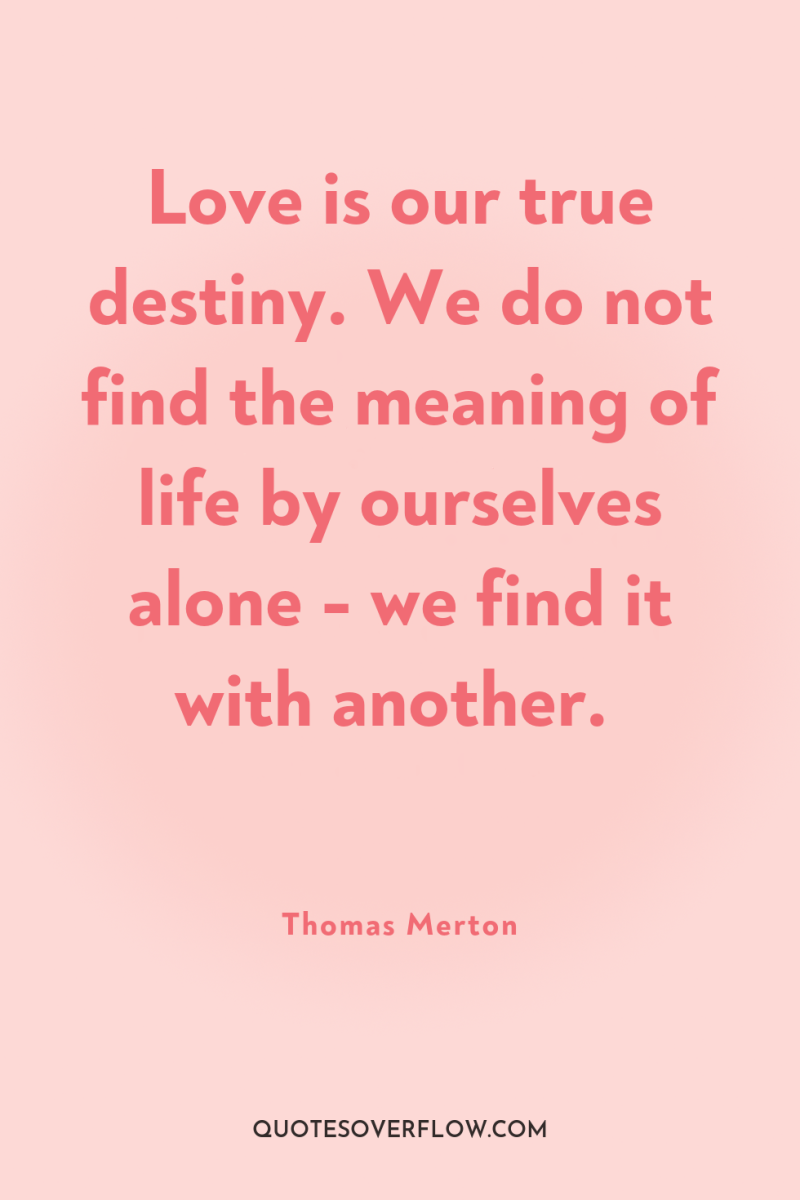
2
Love is our true destiny. We do not find the meaning of life by ourselves alone - we find it with another.Thomas Merton
3
If you want to identify me, ask me not where I live, or what I like to eat, or how I comb my hair, but ask me what I am living for, in detail, ask me what I think is keeping me from living fully for the thing I want to live for.Thomas Merton
4
If a man is to live, he must be all alive, body, soul, mind, heart, spirit.Thomas Merton
5
To be grateful is to recognize the Love of God in everything He has given us - and He has given us everything. Every breath we draw is a gift of His love, every moment of existence is a grace, for it brings with it immense graces from Him. Gratitude therefore takes nothing for granted, is never unresponsive, is constantly awakening to new wonder and to praise of the goodness of God. For the grateful person knows that God is good, not by hearsay but by experience. And that is what makes all the difference.Thomas Merton
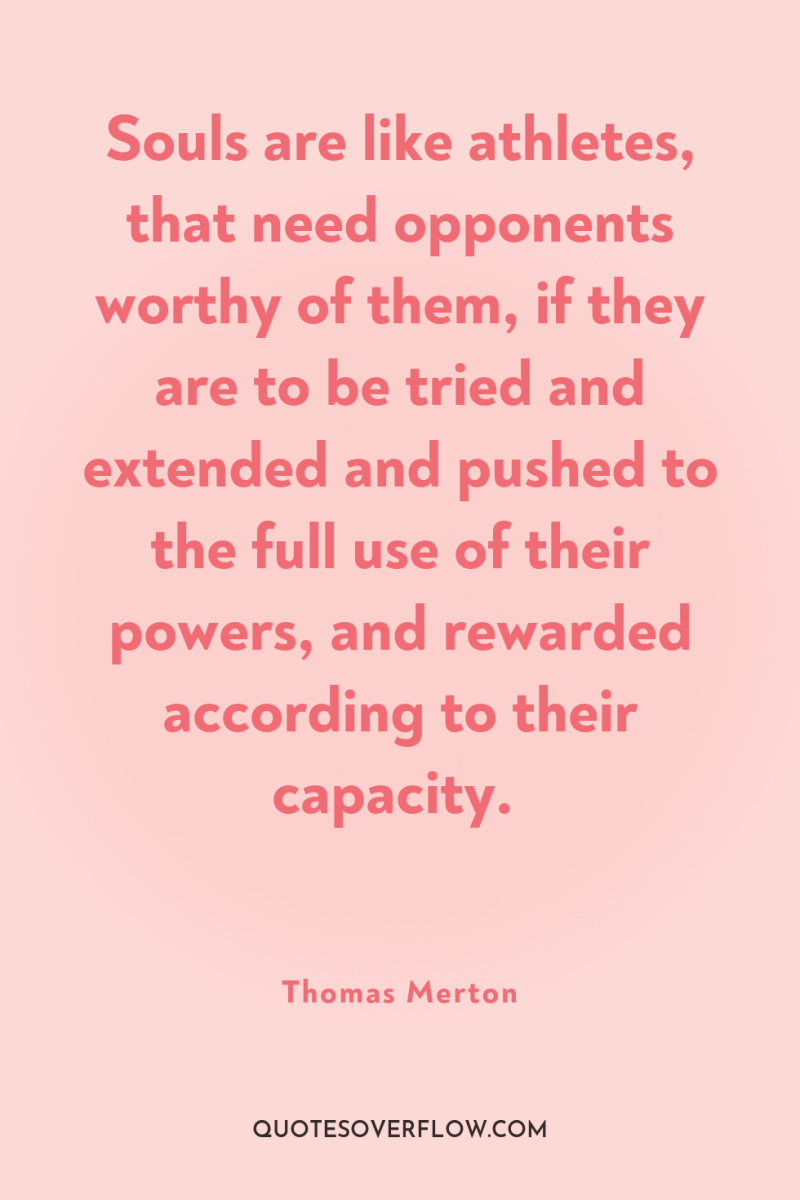
6
Souls are like athletes, that need opponents worthy of them, if they are to be tried and extended and pushed to the full use of their powers, and rewarded according to their capacity.Thomas Merton
7
By reading the scriptures I am so renewed that all nature seems renewed around me and with me. The sky seems to be a pure, a cooler blue, the trees a deeper green. The whole world is charged with the glory of God and I feel fire and music under my feet.Thomas Merton

8
Our idea of God tells us more about ourselves than about Him.Thomas Merton
9
Consequently, the truth of God lives in our souls more by the power of superior moral courage than by the light of an eminent intelligence. Indeed, spiritual intelligence itself depends on the fortitude and patience with which we sacrifice ourselves for the truth, as it is communicated to our lives concretely in the providential will of GodThomas Merton
10
The man who fears to be alone will never be anything but lonely, no matter how much he may surround himself with people. But the man who learns, in solitude and recollection, to be at peace with his own loneliness, and to prefer its reality to the illusion of merely natural companionship, comes to know the invisible companionship of God. Such a one is alone with God in all places, and he alone truly enjoys the companionship of other men, because he loves them in God in Whom their presence is not tiresome, and because of Whom his own love for them can never know satiety.Thomas Merton
11
I was not sure where I was going, and I could not see what I would do when I got [there]. But you saw further and clearer than I, and you opened the seas before my ship, whose track led me across the waters to a place I had never dreamed of, and which you were even then preparing to be my rescue and my shelter and my home.Thomas Merton

12
True happiness is not found in any other reward than that of being united with God. If I seek some other reward besides God Himself, I may get my reward but I cannot be happy.Thomas Merton
13
Surrender your own poverty and acknowledge your nothingness to the Lord. Whether you understand it or not, God loves you, is present in you, lives in you, dwells in you, calls you, saves you and offers you an understanding and compassion which are like nothing you have ever found in a book or heard in a sermon.Thomas Merton
14
Most of the world is either asleep or dead. The religious people are, for the most part, asleep. The irreligious are dead. Those who are asleep are divided into two classes, like the Virgins in the parable, waiting for the Bridegroom's coming. The wise have oil in their lamps. That is to say they are detached from themselves and from the cares of the world, and they are full of charity. They are indeed waiting for the Bridegroom, and they desire nothing else but His coming, even though they may fall asleep while waiting for Him to appear. But the others are not only asleep: they are full of other dreams and other desires. Their lamps are empty because they have burned themselves out in the wisdom of the flesh and in their own vanity. When He comes, it is too late for them to buy oil. They light their lamps only after He has gone. So they fall asleep again, with useless lamps, and when they wake up they trim them to investigate, once again, the matters of a dying world.Thomas Merton
15
There is something in the depths of our being that hungers for wholeness and finality. Because we are made for eternal life, we are made for an act that gathers up all the powers and capacities of our being and offers them simultaneously and forever to God. The blind spiritual instinct that tells us obscurely that our owns lives have a particular importance and purpose, and which urges us to find out our vocation, seeks in so doing to bring us to a decision that will dedicate our lives irrevocably to their true purpose. The man who loses this sense of his own personal destiny, and who renounces all hope of having any kind of vocation in life has either lost all hope of happiness or else has entered upon some mysterious vocation that God alone can understand. .Thomas Merton
16
The Lord did not create suffering. Pain and death came into the world with the fall of man. But after man had chosen suffering in preference to the joys of union with God, the Lord turned suffering itself into a way by which man could come to the perfect knowledge of God.Thomas Merton
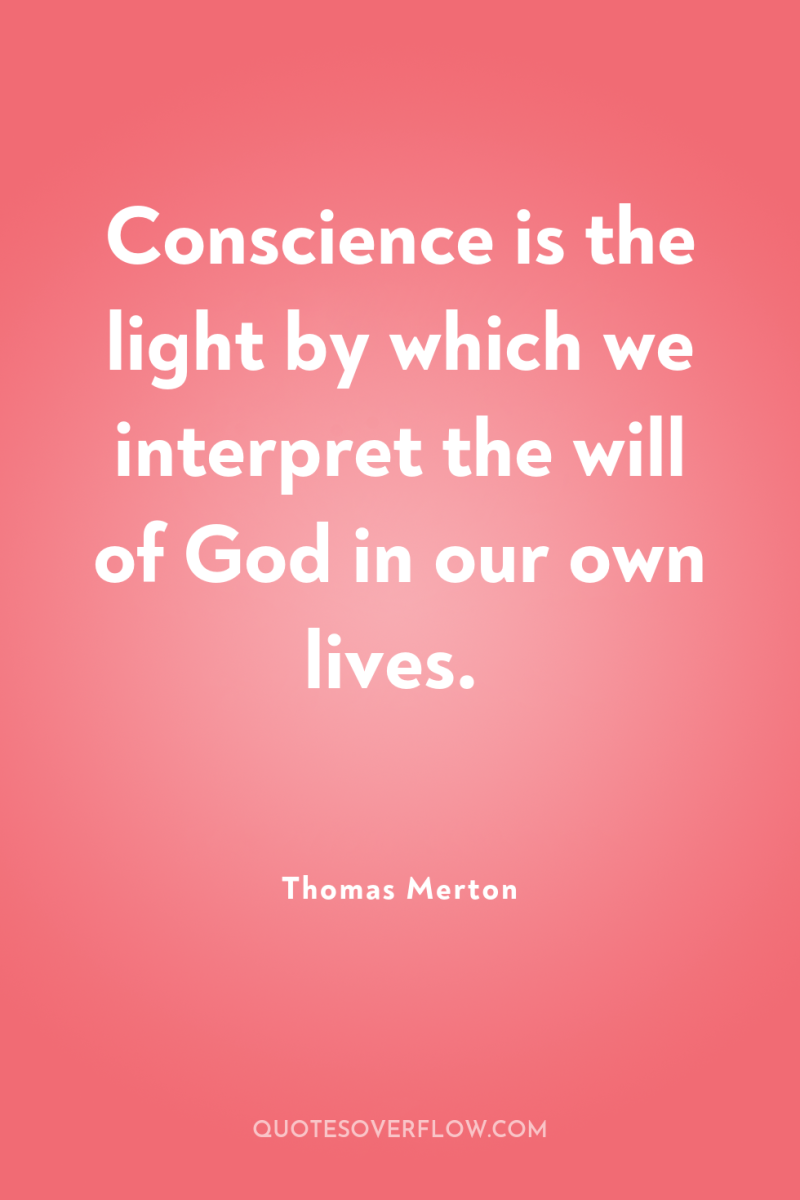
17
Conscience is the light by which we interpret the will of God in our own lives.Thomas Merton
18
The whole function of the life of prayer is, then, to enlighten and strengthen our conscience so that it not only knows and perceives the outward, written precepts of the moral and divine laws, but above all lives God's law in concrete reality by perfect and continual union with His will.Thomas Merton
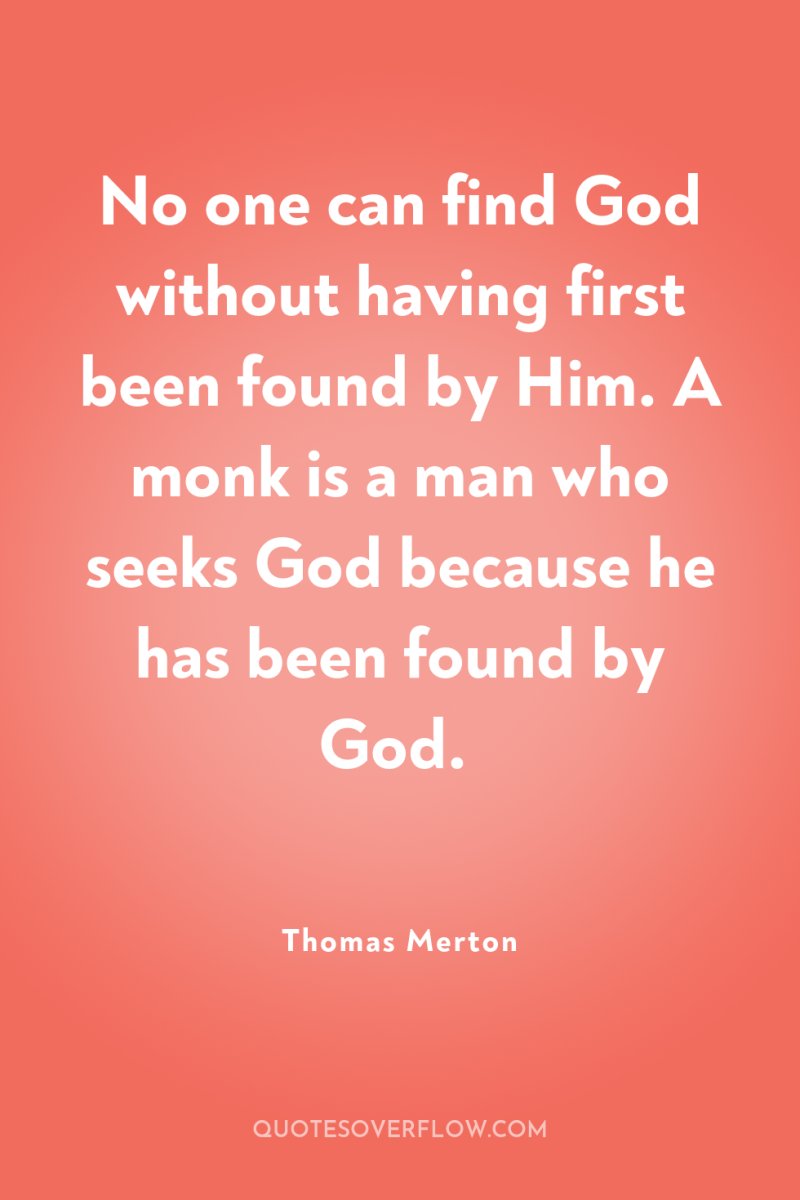
19
No one can find God without having first been found by Him. A monk is a man who seeks God because he has been found by God.Thomas Merton
20
....it is of the very essence of Christianity to face suffering and death not because they are good, not because they have meaning, but because the resurrection of Jesus has robbed them of their meaning.Thomas Merton
21
You do not need to know precisely what is happening, or exactly where it is all going. What you need is to recognize the possibilities and challenges offered by the present moment, and to embrace them with courage, faith and hope.Thomas Merton
22
To enter into the realm of contemplation, one must in a certain sense die: but this death is in fact the entrance into a higher life. It is a death for the sake of life, which leaves behind all that we can know or treasure as life, as thought, as experience as joy, as being. [Every form of intuition and experience] die to be born again on a higher level of life.Thomas Merton
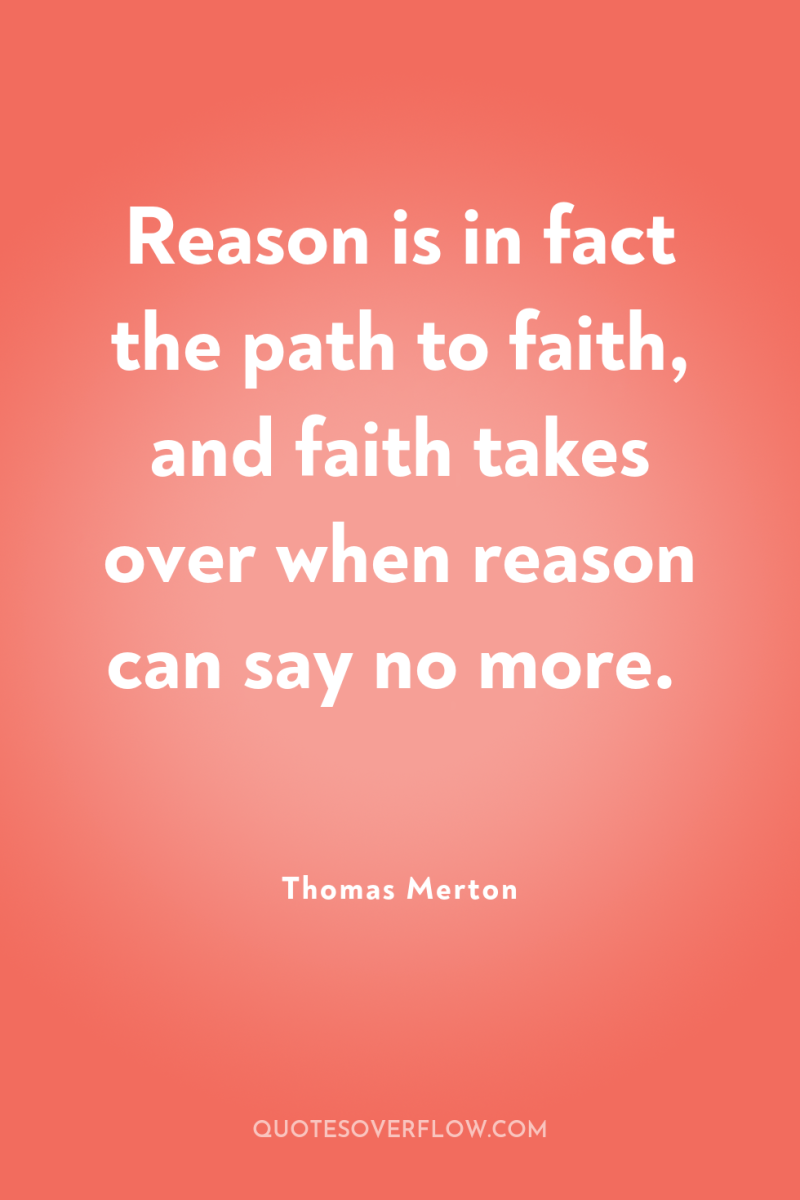
23
Reason is in fact the path to faith, and faith takes over when reason can say no more.Thomas Merton
24
Faith is the door to the full inner life of the Church, a life which includes not only access to an authoritative teaching but above all to a deep personal experience which is at once unique and yet shared by the whole Body of Christ, in the Spirit of Christ.Thomas Merton
25
My Lord God, I have no idea where I am going. I do not see the road ahead of me. I cannot know for certain where it will end. Nor do I really know myself, and the fact that I think that I am following your will does not mean that I am actually doing so. But I believe that the desire to please you does in fact please you. And I hope I have that desire in all that I am doing. I hope that I will never do anything apart from that desire. And I know that if I do this you will lead me by the right road though I may know nothing about it. Therefore will I trust you always though I may seem to be lost and in the shadow of death. I will not fear, for you are ever with me, and you will never leave me to face my perils alone. .Thomas Merton
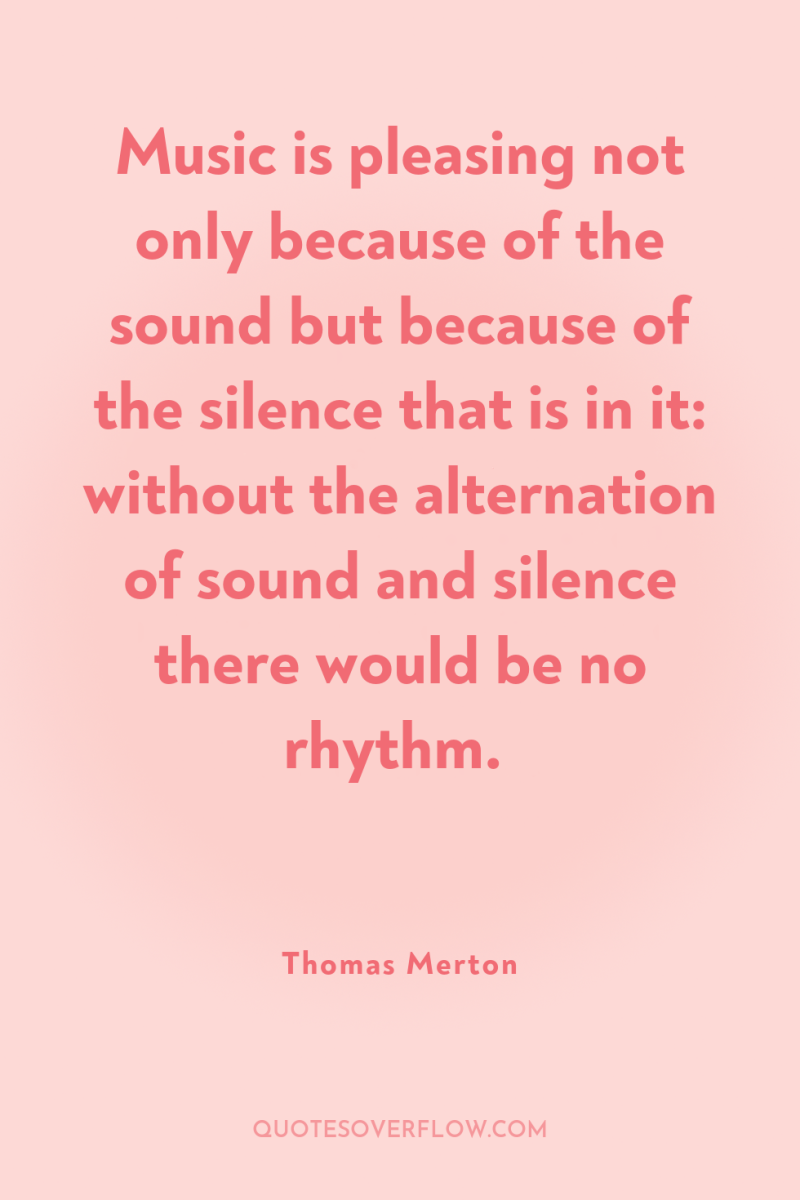
26
Music is pleasing not only because of the sound but because of the silence that is in it: without the alternation of sound and silence there would be no rhythm.Thomas Merton
27
Peace cannot be built on exclusivism, absolutism, and intolerance. But neither can it be built on vague liberal slogans and pious programs gestated in the smoke of confabulation. There can be no peace on earth without the kind of inner change that brings man back to his "right mind." p. 31Thomas Merton
28
Who is willing to be satisfied with a job that expresses all his limitations? He will accept such work only as a 'means of livelihood' while he waits to discover his 'true vocation'. The world is full of unsuccessful businessmen who still secretly believe they were meant to be artists or writers or actors in the movies.Thomas Merton
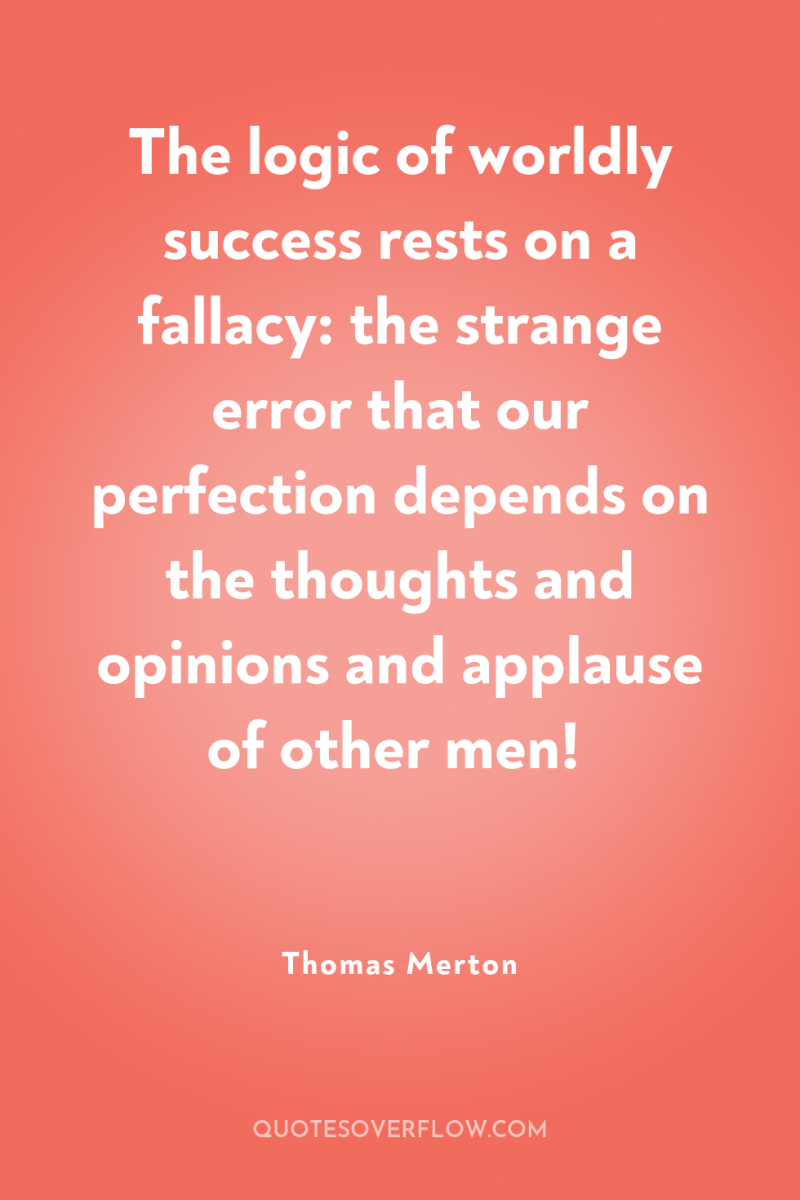
29
The logic of worldly success rests on a fallacy: the strange error that our perfection depends on the thoughts and opinions and applause of other men!Thomas Merton

30
A man who fails well is greater than one who succeeds badly.Thomas Merton
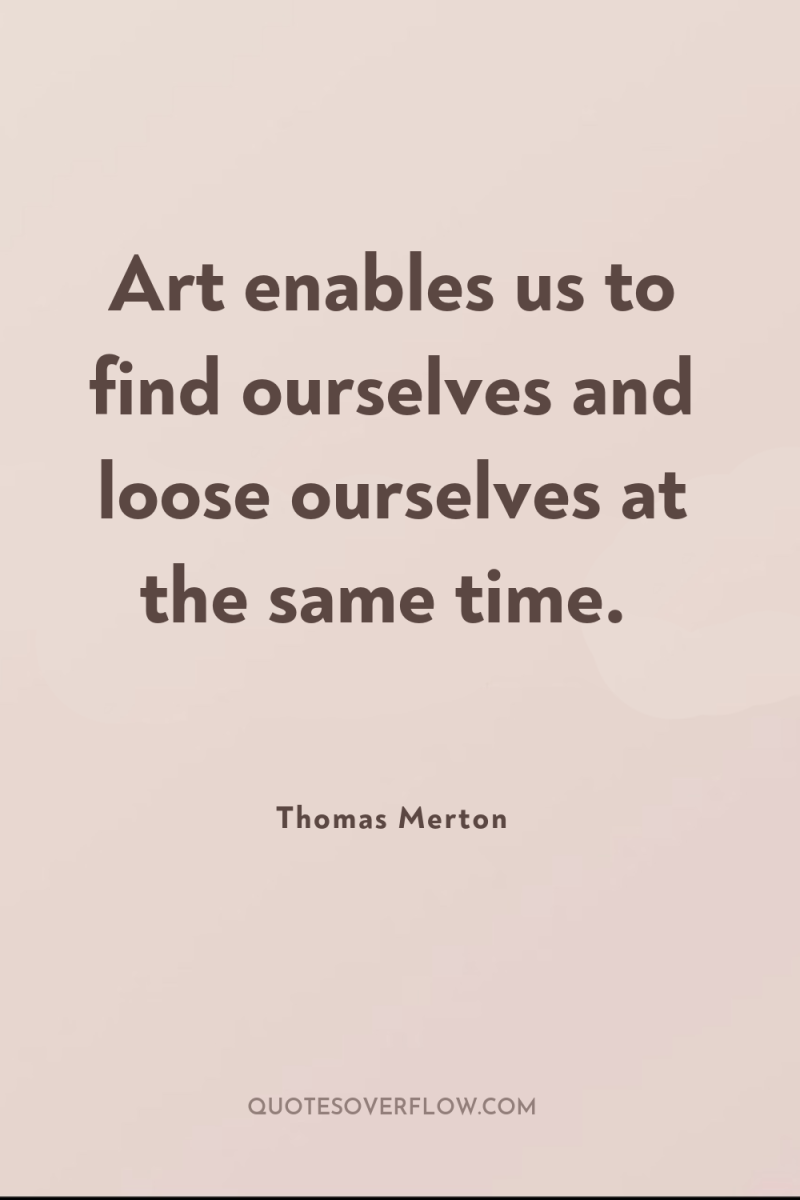
31
Art enables us to find ourselves and loose ourselves at the same time.Thomas Merton
32
It is true that neither the ancient wisdoms nor the modern sciences are complete in themselves. They do not stand alone. They call for one another. Wisdom without science is unable to penetrate the full sapiential meaning of the created and the material cosmos. Science without wisdom leaves man enslaved to a world of unrelated objects in which there is no way of discovering (or creating) order and deep significance in man's own pointless existence. (p. 4).Thomas Merton
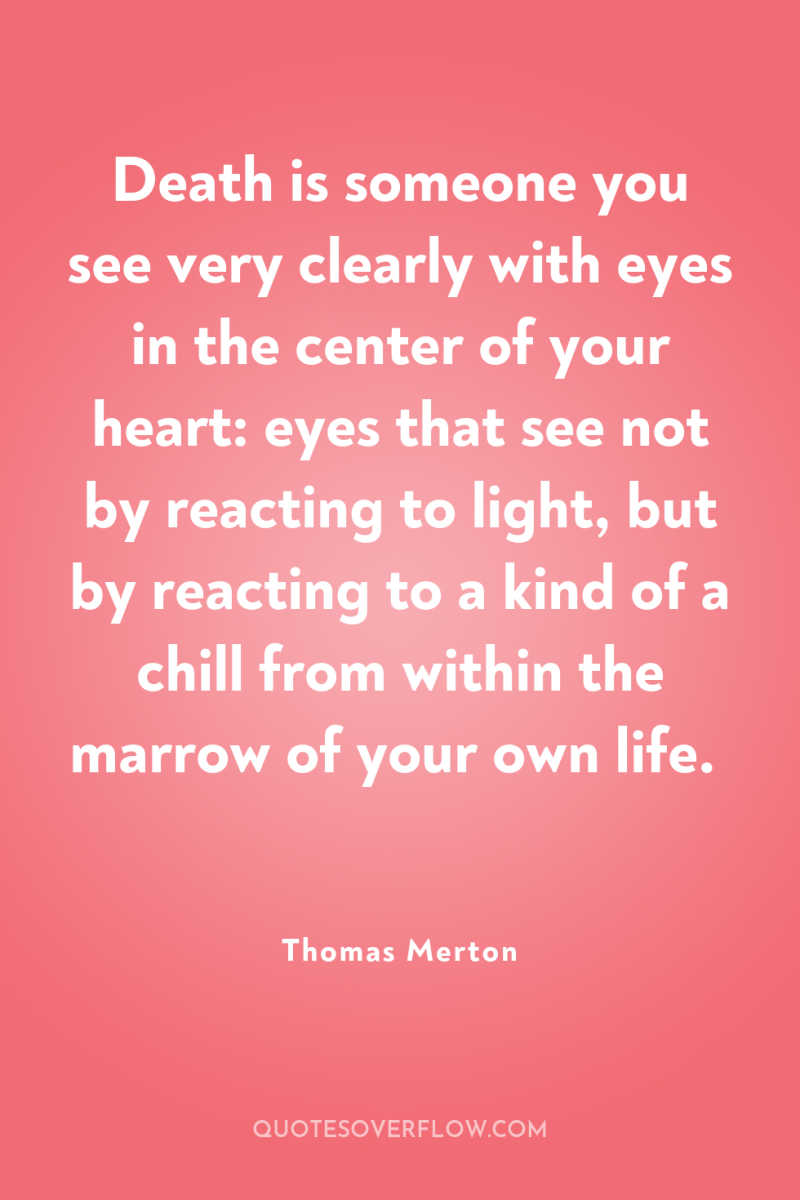
33
Death is someone you see very clearly with eyes in the center of your heart: eyes that see not by reacting to light, but by reacting to a kind of a chill from within the marrow of your own life.Thomas Merton
34
I have my own way to walk and for some reason or other Zen is right in the middle of it wherever I go. So there it is, with all its beautiful purposelessness, and it has become very familiar to me though I do not know "what it is." Or even if it is an "it." Not to be foolish and multiply words, I'll say simply that it seems to me that Zen is the very atmosphere of the Gospels, and the Gospels are bursting with it. It is the proper climate for any monk, no matter what kind of monk he may be. If I could not breathe Zen I would probably die of spiritual asphyxiation. .Thomas Merton
35
Everything in modern city life is calculated to keep man from entering into himself and thinking about spiritual things. Even with the best of intentions a spiritual man finds himself exhausted and deadened and debased by the constant noise of machines and loudspeakers, the dead air and the glaring lights of offices and shops, the everlasting suggestion of advertising and propaganda. The whole mechanism of modern life is geared for a flight from God and from the spirit into the wilderness of neurosis.Thomas Merton
36
The geographical pilgrimage is the symbolic acting out an inner journey. The inner journey is the interpolation of the meanings and signs of the outer pilgrimage. One can have one without the other. It is best to have both.Thomas Merton
37
The fact that our being necessarily demands to be expressed in action should not lead us to believe that as soon as we stop acting we cease to exist. We do not live merely to “do something” — no matter what. We do not live more fully merely by doing something more, seeing more, tasting more and experiencing more than we ever have before. Everything depends on the quality of our acts and experiences. A multitude of badly performed actions and experiences only half-lived exhausts and depletes our being. By doing things badly we make ourselves less real. This growing unreality cannot help but make us unhappy and fill us with a sense of guilt. There are times then when in order to keep ourselves in existence at all, we simply have to sit back awhile and do nothing. And for a man who has let himself be drawn completely out of himself by his activity, nothing is more difficult than to sit still and rest, doing nothing at all. We must first recover the possession of our own being before we can act or taste or experience reality. .Thomas Merton

38
The cause of liberty becomes a mockery if the price to be paid is the wholesale destruction of those who are to enjoy liberty. Ghandi, quoted in Merton, p. 68Thomas Merton
39
It is the will of God that we live not only as rational beings, but as 'new men' regenerated by the Holy Spirit in Christ. It is His will that we reach out for our inheritance, that we answer His call to be His sons. We are born men without our consent, but the consent to be sons of God has to be elicited by our own free will.Thomas Merton
40
The story of the Fall tells us in mythical language that "original sin" is not simply a stigma arbitrarily making good pleasures seem guilty, but a basic inauthenticity, a kind of predisposition to bad faith in our understanding of ourselves and of the world. It implies a determined willfulness in trying to make things be other than they are in order that we may be able to make them subserve, at any moment, to our individual desire for pleasure or for power. But since things do not obey our arbitrary impulsions, and since we cannot make the world correspond to and confirm the image of it dictated by our needs and illusions, our willfulness is inseparable from error and from suffering. Hence, Buddhism says, deluded life itself is in a state of Dukkha, and every movement of desire tends to bear ultimate fruit in pain rather than lasting joy, in hate rather than love, in destruction rather than creation. (Let us note in passing that when technological skill seems in fact to give man almost absolute power in manipulating the world, this fact is no way reverses his original condition of brokenness and error but only makes it all the more obvious. We who live in the age of the H-bomb and the extermination camp have reason to reflect on this, though such reflection is a bit unpopular.) .Thomas Merton
41
Modern man, in so far as he is still Cartesian (he is of course going far beyond Descartes in many respects), is a subject for whom his own self-awareness as a thinking, observing, measuring and estimating "self" is absolutely primary. It is for him the one indubitable "reality, " and all truth starts here. The more he is able to develop his consciousness as a subject over against objects, the more he can understand things in their relations to him and one another, the more he can manipulate these objects for his own interests, but also, at the same time, the more he tends to isolate himself in his own subjective prison, to become a detached observer cut off from everything else in a kind of impenetrable alienated and transparent bubble which contains all reality in the form of purely subjective experience. Modern consciousness then tends to create this solipsistic bubble of awareness - an ego-self imprisoned in its own consciousness, isolated and out of touch with other such selves in so far as they are all "things" rather than persons. .Thomas Merton
42
It is this kind of consciousness, exacerbated to an extreme, which has made inevitable the so called "death of God." Cartesian thought began with an attempt to reach God as object by starting from the thinking self. But when God becomes object, he sooner or later "dies, " because God as object is ultimately unthinkable. God as object is not only a mere abstract concept, but one which contains so many internal contradictions that it becomes entirely nonnegotiable except when it is hardened into an idol that is maintained in existence by a sheer act of will. For a long time man continued to be capable of this willfulness: but now the effort has become exhausting and many Christians have realised it to be futile. Relaxing the effort, they have let go the "God-object" which their fathers and grandfathers still hoped to manipulate for their own ends. Their weariness has accounted for the element of resentment which made this a conscious "murder" of the deity. Liberated from the strain of willfully maintaining an object- God in existence, the Cartesian consciousness remains none the less imprisoned in itself. Hence the need to break out of itself and to meet "the other" in "encounter, " "openness, " "fellowship, " "communion".Thomas Merton
43
The point where you become free not to kill, not to exploit, not to destroy, not to compete, because you are no longer afraid of death or the devil or poverty or failure. If you discover this nakedness, you’d better keep it private. People don’t like it.Thomas Merton
44
Art enables us to find ourselves and lose ourselves at the same time.Thomas Merton
45
Art enables us to find ourselves and lose ourselves at the same time. The mind that responds to the intellectual and spiritual values that lie hidden in a poem, a painting, or a piece of music, discovers a spiritual vitality that lifts it above itself, takes it out of itself, and makes it present to itself on a level of being that it did not know it could ever achieve.Thomas Merton
46
His vision was religious and clean, and therefore his paintings were without decoration or superfluous comment, since a religious man respects the power of God's creation to bear witness for itself.Thomas Merton
47
When you expect the world to end at any moment, you know there is no need to hurry. You take your time, you do your work well.Thomas Merton
48
Bodily agitation, then, is an enemy to the spirit. And by agitation I do not necessarily mean exercise or movement. There is all the difference in the world between agitation and work. Work occupies the body and the mind and is necessary for the health of the spirit. Work can help us to pray and be recollected if we work properly. Agitation, however, destroys the spiritual usefulness of work and even tends to frustrate its physical and social purpose. Agitation is the useless and ill-directed action of the body. It expresses the inner confusion of a soul without peace. Work brings peace to the soul that has a semblance of order and spiritual understanding. It helps the soul to focus upon its spiritual aims and to achieve them. But the whole reason for agitation is to hide the soul from itself, to camouflage its interior conflicts and their purposelessness, and to induce a false feeling that 'we are getting somewhere'.Thomas Merton
49
Instead of hating the people you think are war-makers, hate the appetites and disorder in your own soul, which are the causes of war. If you love peace, then hate injustice, hate tyranny, hate greed - but hate these things in yourself, not in another.Thomas Merton
50
Peace demands the most heroic labor and the most difficult sacrifice. It demands greater heroism than war. It demands greater fidelity to the truth and a much more perfect purity of conscience.Thomas Merton
51
To allow oneself to be carried away By a multitude of conflicting concerns, To surrender to too many demands, ... To commit oneself to too many projects, To want to help everyone with everything Is to succumb to violence.Thomas Merton
52
The married man and the mother of a Christian family, if they are faithful to their obligations, will fulfill a mission that is as great as it is consoling: that of bringing into the world and forming young souls capable of happiness and love, souls capable of sanctification and transformation in Christ.Thomas Merton
53
We have the choice of two identities: the external mask which seems to be real...and the hidden, inner person who seems to us to be nothing, but who can give himself eternally to the truth in whom he subsists. (295)Thomas Merton
54
I was entering into a moral universe in which I would be related to every other rational being, and in which whole masses of us, as thick as swarming bees, would drag one another along towards some common end of good or evil, peace or war.Thomas Merton
55
When men live huddled together without true communication, there seems to be a greater sharing, and a more genuine communion. But this is not communion, only immersion in the general meaninglessness of countless slogans and clichés repeated over and over again so that in the end one listens without hearing and responds without thinking. The constant din of empty words and machine noises, the endless booming of loudspeakers end by making true communication and true communion almost impossible..Thomas Merton
56
There are so many voices heard today asserting that one should "have religion" or "believe, " but all they mean is that one should associate himself, "sign up" with some religious group. Stand up and be counted. As if religion were somehow primarily a matter of gregariousness...Thomas Merton
57
True contemplation is not a psychological trick but a theological grace. It can come to us ONLY as a gift, and not as a result of our own clever use of spiritual techniques.Thomas Merton
58
First of all, although men have a common destiny, each individual also has to work out his own personal salvation for himself in fear and trembling. We can help one another to find the meaning of life no doubt. But in the last analysis, the individual person is responsible for living his own life and for "finding himself." If he persists in shifting his responsibility to somebody else, he fails to find out the meaning of his own existence. You cannot tell me who I am and I cannot tell you who you are. If you do not know your own identity, who is going to identify you? .Thomas Merton
59
For each one of us, there is only one thing necessary: to fulfill our own destiny, according to God's will, to be what God wants us to be.Thomas Merton
60
Our Christian destiny is, in fact, a great one: but we cannot achieve greatness unless we lose all interest in being great. For our own idea of greatness is illusory, and if we pay too much attention to it we will be lured out of the peace and stability of the being God gave us, and seek to live in a myth we have created for ourselves. And when we are truly ourselves we lose most of the futile self-consciousness that keeps us constantly comparing ourselves with others in order to see how big we are.Thomas Merton
61
Do not desire chiefly to be cherished and consoled by God; desire above all to love Him.Do not anxiously desire to have others find consolation in God, but rather help them to love God.Do not seek consolation in talking about God, but speak of Him in order that He may be glorified. If you truly love Him, nothing can console you but His glory. And if you seek His glory before everything else, then you will also be humble enough to receive consolation from His hand: accepting it chiefly because, in showing His mercy to us, He is glorified in our souls.Thomas Merton
62
The wise man has struggled to find You in his wisdom, and he has failed. The just man has striven to grasp You in his own justice, and he has gone astray. But the sinner, suddenly struck by the lightning of mercy that ought to have been justice, falls down in adoration of Your holiness: for he had seen what kings desired to see and never saw, what prophets foretold and never gazed upon, what the men of ancient times grew weary of expecting when they died. He has seen that Your love is so infinitely good that it cannot be the object of a human bargain. .Thomas Merton
63
We cannot find Him unless we know we need Him. We forget this need when we take a self-sufficient pleasure in our own good works. The poor and helpless are the first to find Him, Who came to seek and to save that which was lost.Thomas Merton
64
We do not want to be beginners [at prayer]. but let us be convinced of the fact that we will never be anything but beginners, all our life!Thomas Merton
65
The lights of prayer that make us imagine we are beginning to be angels are sometimes only signs that we are finally beginning to be men. We do not have a high enough opinion of our own nature. We think we are at the gates of heaven and we are only just beginning to come into our own realm as free and intelligent beings.Thomas Merton
66
The ever-changing reality in the midst of which we live should awaken us to the possibility of an uninterrupted dialogue with God. By this I do not mean continuous “talk, ” or a frivolously conversational form of affective prayer which is sometimes cultivated in convents, but a dialogue of love and of choice. A dialogue of deep wills.Thomas Merton
67
Prayer does not blind us to the world, but it transforms our vision of the world, and makes us see it, all men, and all the history of mankind, in the light of God. To pray 'in spirit and in truth' enables us to enter into contact with that infinite love, that inscrutable freedom which is at work behind the complexities and the intricacies of human existence. This does not mean fabricating for ourselves pious rationalizations to explain everything that happens. It involves no surreptitious manipulation of the hard truths of life. .Thomas Merton
68
Hence the aim of meditation, in the context of Christian faith, is not to arrive at an objective and apparently 'scientific' knowledge of God, but to come to know him through the realization that our very being is penetrated with his knowledge and love for us. Our knowledge of God is paradoxically a knowledge not of him as the object of our scrutiny, but of ourselves as utterly dependent on his saving and merciful knowledge of us. It is in proportion as we are known to him that we find our real being and identity in Christ. We know him and through ourselves in so far as his truth is the source of our being and his merciful love is the very heart of our life and existence. We have no other reason for being, except to be loved by him as our Creator and Redeemer, and to love him in return. There is no true knowledge of God that does not imply a profound grasp and an intimate personal acceptance of this profound relationship.Thomas Merton
69
We must approach our meditation realizing that 'grace, ' 'mercy, ' and 'faith' are not permanent inalienable possessions which we gain by our efforts and retain as though by right, provided that we behave ourselves. They are CONSTANTLY RENEWED GIFTS. The life of grace in our hearts is renewed from moment to moment, directly and personally by God in his love for us.Thomas Merton
70
There is a 'movement' of meditation, expressing the basic 'paschal' rhythm of the Christian life, the passage from death to life in Christ. Sometimes prayer, meditation and contemplation are 'death' - a kind of descent into our own nothingness, a recognition of helplessness, frustration, infidelity, confusion, ignorance. Note how common this theme is in the Psalms. If we need help in meditation we can turn to scriptural texts that express this profound distress of man in his nothingness and his total need of God. Then as we determine to face the hard realities of our inner life and humbly for faith, he draws us out of darkness into light - he hears us, answers our prayer, recognizes our need, and grants us the help we require - if only by giving us more faith to believe that he can and will help us in his own time. This is already a sufficient answer.Thomas Merton
71
Whether you teach or live in the cloister or nurse the sick, whether you are in religion or out of it, married or single, no matter who you are or what you are, you are called to the summit of perfection: you are called to a deep interior life perhaps even to mystical prayer, and to pass the fruits of your contemplation on to others. And if you cannot do so by word, then by example. Yet if this sublime fire of infused love burns in your soul, it will inevitably send forth throughout the Church and the world an influence more tremendous than could be estimated by the radius reached by words or by example.Thomas Merton
72
The only trouble is that in the spiritual life there are no tricks and no shortcuts. Those who imagine that they can discover spiritual gimmicks and put them to work for themselves usually ignore God's will and his grace.Thomas Merton
73
It is not merely our own desire but the desire of Christ in His Spirit that drives us to grow in love. Those who seldom or never feel in their hearts the desire for the love of God and other men, and who do not thirst for the pure waters of desire which are poured out in us by the strong, living God, are usually those who have drunk from other rivers or have dug for themselves broken cisterns.Thomas Merton
74
God has left sin in the world in order that there may be forgiveness: not only the secret forgiveness by which He Himself cleanses our souls, but the manifest forgiveness by which we have mercy on one another and so give expression to the fact that He is living, by His mercy, in our own hearts.Thomas Merton
75
Jesus lived and died in vain if He did not teach us to regulate the whole of life by the eternal law of love. Gandhi, quoted in Merton, p. 38Thomas Merton
76
And yet with every wound You robbed me of a crime, And as each blow was paid with Blood, You paid me also each great sin with greater graces. For even as I killed You, You made Yourself a greater thief than any in Your company, Stealing my sins into Your dying life, Robbing me even of my death.Thomas Merton
77
To desire Him to be merciful to us is to acknowledge Him as God. To seek His pity when we deserve no pity is to ask Him to be just with a justice so holy that it knows no evil and shows mercy to everyone who does not fly from Him in despair.Thomas Merton
78
It is by the Holy Spirit that we love those who are united to us in Christ. The more plentifully we have received of the Spirit of Christ, the more perfectly we are able to love them: and the more we love them the more we receive the Spirit. It is clear, however, that since we love them by the Spirit Who is given to us by Jesus, it is Jesus Himself Who loves them in us.Thomas Merton
79
It is therefore of supreme importance that we consent to live not for ourselves but for others. When we do this we will be able first of all to face and accept our own limitations. As long as we secretly adore ourselves, our own deficiencies will remain to torture us with an apparent defilement. But if we live for others, we will gradually discover that no expects us to be 'as gods'. We will see that we are human, like everyone else, that we all have weaknesses and deficiencies, and that these limitations of ours play a most important part in all our lives. It is because of them that we need others and others need us. We are not all weak in the same spots, and so we supplement and complete one another, each one making up in himself for the lack in another. .Thomas Merton
80
Pardon all runners, All speechless, alien winds, All mad waters. Pardon their impulses, Their wild attitudes, Their young flights, their reticence. When a message has no clothes on How can it be spoken.Thomas Merton
81
We overcome the evil in the world by the charity and compassion of God, and in so doing we drive all evil out of our own hearts. The evil that is in us is more than moral. There is a psychological evil, the distortion caused by selfishness and sin. Good moral intentions are enough to correct what is formally bad in our moral acts. But in order that our charity may heal the wounds of sin in our whole soul it must reach down into the furthest depths of our humanity, cleaning out all the infection of anxiety and false guilt that spring from pride and fear, releasing the good that has been held back by suspicion and prejudice and self-conceit. Everything in our nature must find its right place in the life of charity, so that the whole man may be lifted up to God, that the entire person may be sanctified and not only the intentions of his will.Thomas Merton
82
To know the Cross is not merely to know our own sufferings. For the Cross is the sign of salvation, and no man is saved by his own sufferings. To know the Cross is to know that we are saved by the sufferings of Christ; more, it is to know the love of Christ Who underwent suffering and death in order to save us. It is, then, to know Christ.Thomas Merton
83
The biggest human temptation is to settle for too little.Thomas Merton
84
Every man becomes the image of the God he adores. He whose worship is directed to a dead thing becomes dead. He who loves corruption rots. He who loves a shadow becomes, himself, a shadow. He who loves things that must perish lives in dread of their perishing.Thomas Merton
85
He's not a safe safe or a tame God, securely lodged behind the bars of a distant Heaven; He has the most annoying manner of showing up when we least want Him; of confronting us in the strangest ways.Thomas Merton
86
The deepest need of our darkness is to comprehend the light which shines in the midst of it.Thomas Merton
87
In the use of force, one simplifies the situation by assuming that the evil to be overcome is clear-cut, definite, and irreversible. Hence there remains but one thing: to eliminate it. Any dialogue with the sinner, any question of the irreversibility of his act, only means faltering and failure. Failure to eliminate evil is itself a defeat. Anything that even remotely risks such defeat is in itself capitulation to evil. The irreversibility of evil then reaches out to contaminate even the tolerant thought of the hesitant crusader who, momentarily, doubts the total evil of the enemy he is about to eliminate. p. 21 .Thomas Merton
88
Words stand between silence and silence: between the silence of things and the silence of our own being. Between the silence of the world and the silence of God. When we have really met and known the world in silence, words do not separate us from the world nor from other men, nor from God, nor from ourselves because we no longer trust entirely in language to contain reality.Thomas Merton
89
I will no longer wound myself with the thoughts and questions that have surrounded me like thorns: that is a penance You do not ask of me.Thomas Merton
90
But there is greater comfort in the substance of silence than in the answer to a question.Thomas Merton
91
Our vocation is not simply to be, but to work together with God in the creation of our own life, our own identity, our own destiny.... To work out our identity in God.Thomas Merton
92
We are what we love. If we love God, in whose image we were created, we discover ourselves in him and we cannot help being happy: we have already achieved something of the fullness of being for which we were destined in our creation. If we love everything else but God, we contradict the image born in our very essence, and we cannot help being unhappy, because we are living a caricature of what we are meant to be.Thomas Merton
93
The real reason why so few men believe in God is that they have ceased to believe that even a God can love them.Thomas Merton
94
Those who refuse His mercy satisfy His justice in another way. Without His mercy, they cannot love Him. Without love for Him they cannot be 'justified' or 'made just'. That is to say: they cannot conform to Him Who is love. Those who have not received His mercy are in a state of injustice with regard to Him. It is their own injustice that is condemned by His justice. And in what does their injustice consist? In the refusal of His mercy. We come, in the end, to this basic paradox: that we owe it to God to receive from Him the mercy that is offered to us in Christ, and that to refuse this mercy is the summation of our 'injustice'. Clearly, then, only the mercy of God can make us just, in this supernatural sense, since the primary demand of God's justice upon us is that we receive His mercy.Thomas Merton
95
The greatest temptations are not those that solicit our consent to obvious sin, but those that offer us great evils masking as the greatest goods.Thomas Merton
96
There are different kinds of fear. One of the most terrible is the sensation that you are likely to become, at any moment, the protagonist in a Graham Greene novel: the man who tries to be virtuous and who is, in a certain sense, holy, and yet who is overwhelmed by sin as if there were a kind of fatality about it.Thomas Merton
97
We are not only contingent beings, dependent on the love and will of a Creator whom we cannot know experientially except in so far as he reveals to us our personal relationship with him as his sons - we are also sinners who have FREELY REPUDIATED this relationship. We have rebelled against him. The spirit of rebellious refusal persists in our heart even when we try to return to him. Much could be said, at this point, about all the subtlety and ingenuity of religious egoism which is one of the worst and most ineradicable forms of self-deception. Sometimes one feels that a well-intentioned and inculpable atheist is in many ways better off - and gives more glory to God - than some people whose bigoted complacency and inhumanity to others are signs of the most obvious selfishness! Hence we not only need to recover an awareness of our creaturehood; we also must repair the injury done to truth and to love by this repudiation, this infidelity. But how? Humanly speaking, there is no way in which we can do this.Thomas Merton
98
One of the effects of original sin is an instinctive prejudice in favour of our own selfish desires. We see things as they are not, because we see them centered on ourselves. Fear, anxiety, greed, ambition and our hopeless need for pleasure all distort the image of reality that is reflected in our minds. Grace does not completely correct this distortion all at once: but it gives us a means of recognizing and allowing for it. And it tells us what we must do to correct it. Sincerity must be bought at a price: the humility to recognize our innumerable errors, and fidelity in tirelessly setting them right.Thomas Merton
99
The complacency of the individual who admires his own excellence is bad enough, but it is more respectable than the complacency of the man who has no self-esteem because he has not even a superficial self which he can esteem. He is not a person, not an individual, only an atom. This atomized existence is sometimes praised as humility or as self-sacrifice, some-times it is called obedience, sometimes it is devotion to the dialectic of class war. It produces a kind of peace which is not peace, but only the escape from an immediately urgent sense of conflict. It is the peace not of love but of anesthesia. It is the peace not of self-realization and self-dedication, but of flight into irresponsibility.Thomas Merton
100
Humility is a virtue, not a neurosis.Thomas Merton